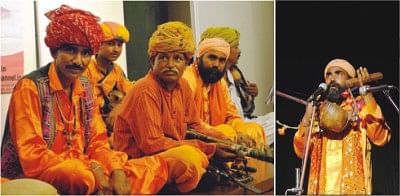Gypsy days

A Jogi singer performs at the event (Right); Kalbeliyas, Bhopas, Jogis and Banjaras at the festival (left).
Suraj Bhopa is a folk healer and musician from village Nanglimega, Alwar district, Rajasthan, North India. He plays the ravan hatha, an ancient Indian musical instrument, and sings ballads to earn a living. “It's a very hard life and I am in grave financial difficulties. We move around so much that the children cannot go to school most of the time,” he laments.
Meera Banjara, from a village in Jaipur (rural) Rajasthan, is skilled in making traditional ponchu nomadic ornaments, which sell for Rs 20 a piece. Work is erratic, she complains, and the returns paltry. However, she is more fortunate than many others since her husband Mamraj gets a regular income as a farmer.
Suraj and Meera are both nomads -- Suraj from the community of Bhopas (bards), Meera from the Banjaras (transporters). They joined up with the Kalbeliyas (snake charmers), Banwariyas (hunters), Gadia Lohars (ironsmiths) and Jogis (Baul singers from the North Indian state of Rajasthan) at a recent Nomadic Fair and Festival. The fair was unique. Normally these insular communities do not even sit or play their musical instruments together. The fair included workshops on nomadic instruments, handicraft exhibitions, nomadic food, and documentary films of these communities along with nomadic concerts in the evenings.
The festival was conceived and curated by husband-wife duo Vinay and Meenakshi Rai. The couple run a non-profit organisation, Chinh, which organised the event in association with ICCR.
The Nomadic Orchestra of the World (NOW) concerts saw a unique jugalbandi of ravanhatha, been, bapang, dhol and ektara. However, some musicians have fallen on hard days, says Meenakshi. “While the others have multiple talents, the Bhopas are entirely dependent on their singing and ravan hatha to make a living. In the earlier days they flourished under the patronage of rajas. Today Bhopas like Suraj earn only when there are special programmes.” In fact, she says, Suraj Bhopa had almost given up his instrument when Chinh brought him back from the brink.
Though many nomads lead a hand to mouth existence, Chinh hopes to give them a better quality of life. With the organisation's support, ponchu nomadic ornaments are making inroads in the domestic and export market. They have now been showcased at 'Dilli Haat', a popular food and crafts bazaar in the Indian capital, and a government organisation has procured ponchu for the Commonwealth Games. Goodri patchwork, made by Gadia Lohars from Uttar Pradesh, India, is another area with high market potential.
Now Chinh has extended a hand to the to the nomadic Baigha and Gond (hunter) communities in Madhya Pradesh. It is going to be a long haul for Chinh but it is slowly getting there.

 For all latest news, follow The Daily Star's Google News channel.
For all latest news, follow The Daily Star's Google News channel. 



Comments